Backlash grows against cashless society


Violators face fines
Arguments against a cashless society include the loss of privacy, as some high-tech companies track every purchase made digitally or by credit cards, and the possibility of computer networks that handle such payments crashing or being hacked.
In the US, federal law does not mandate the use of cash by businesses, but in 1978 Massachusetts became the first-and so far only-state to prohibit retailers from discriminating against cash buyers.
In March, Philadelphia became the first major US city to order stores to accept cash. The order will take effect on July 1, with violators facing a fine of up to $2,000.
Philadelphia councilor Bill Greenlee, coauthor of the bill, said: "Killing cash creates 'us' and 'them' places. I could walk into a coffee shop with my credit card. Someone standing behind me in line with the same amount of money in their pocket, but in cash, cannot buy that product. That seems wrong."
On March 18, New Jersey Governor Phil Murphy followed Philadelphia's move and banned cashless stores with immediate effect. Violators face a fine of at least $2,500.
In San Francisco, brick-and-mortar businesses are required to accept cash for goods and some services. Pop-up stores and internet-only businesses such as ride-hailing companies are exempt, as are food truck businesses, which say they lack the resources to handle cash.
Other US cities, including New York, Chicago and Washington, are considering barring cashless stores to ensure that everyone-including the poor, the homeless and the elderly-can shop with cash.
In New York, Ritchie J. Torres, a councilor for The Bronx, is spearheading the campaign. The Democrat introduced a bill last year that would ban businesses in the city from refusing to accept cash. It has not yet been voted on.
A spokesman for Torres said, "He introduced the bill because there had been a rise in cashless businesses opening specifically in gentrified areas throughout the city. This can have the effect of excluding people, particularly those on low incomes, the underbanked and unbanked in New York from frequenting these establishments.
"If you don't have access to a credit or debit card, then you're not able to use some restaurants. The bill would require restaurants to accept cash. We've received positive feedback, particularly from senior citizens who may be concerned about it because they are used to using cash all of the time. They are supportive of the legislation. In terms of pushback, there has not been much."
Joel Berg, CEO of Hunger Free America, said, "We need to get low-income people long-term access to financial resources that people who are not poor enjoy.


















